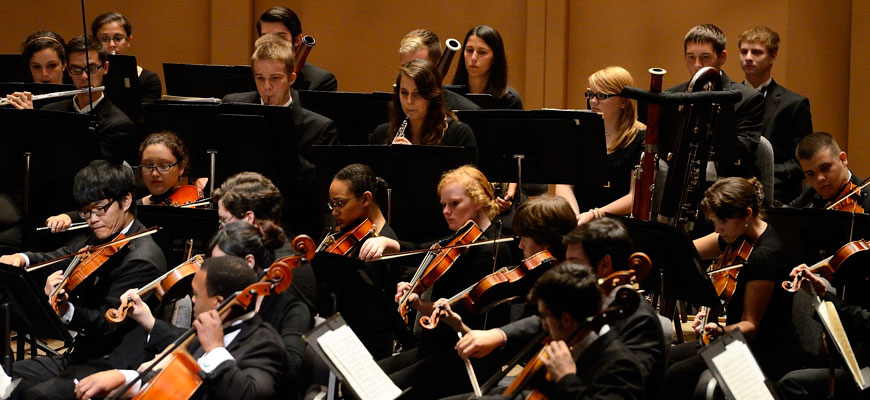
USC Symphony Orchestra gears up for epic season
Posted on: September 25, 2017; Updated on: September 25, 2017
By Taylor Evans, mrassist@mailbox.sc.edu, 803-777-7704
The USC Symphony Orchestra is the premier orchestra at the University of South Carolina and one of the foremost university orchestras in the southeastern United States. The orchestra comprises approximately 100 student musicians who perform six shows throughout the school year in the Koger Center for the Arts, playing a broad spectrum of music literature ranging from classical to contemporary.
The USC Symphony Orchestra is gearing up for an exciting season filled with ambitious pieces and award-winning guest artists that include the university’s renowned music faculty. The ensemble is set to kick off the year with its first performance at 7:30 p.m., Sept. 28.
We caught up with Scott Weiss, School of Music’s Sarah Bolick Smith Distinguished Professor of Music and interim conductor of the USC Symphony Orchestra to find out what’s new for the upcoming 2017-2018 season.
Tell us about the creative direction for the season. We understand the talents of the Carolina faculty will be highlighted.
“Absolutely. The season features four centuries of music. Everything from music that was written in just the last few years, to music going back to Mozart. And right, in addition to featuring great symphonies by composers like Tchaikovsky and Shostakovich and Beethoven and Mahler, we’re also featuring many of our artist faculty here in our terrific School of Music. People like Joseph Eller, our clarinet professor, and our two new string faculty members, Ari Streisfeld and Daniel Sweaney. So it really is putting the students, the faculty and the School of Music on display for everybody here in Columbia.”
What’s new for students?
“Well what’s new for students is that all USC students get into our concerts for free. This is really something very important to me. Symphony orchestras around our country are struggling. Audiences are aging. They’re having trouble getting people to buy tickets to their concerts, and I think there is a disconnect with younger people. They think about classical music and perhaps have a certain conception of what that is. I think it’s a lot more exciting than that conception might be, so we want students to come to our concerts. The way we’re doing that is by inviting all USC students. And all they have to do is go to the box office by 5 p.m. on the day of the concert with their student ID to get a free ticket. After 5 p.m., if they show up the night of the concert, they’d actually have to buy a ticket. It’s the only way that the box office can manage the event.”
What works are you particularly excited about?
“Is it okay if I say all of them? You know our season opens next Thursday night, Sept. 28, and we’re playing a brand new cello concerto by a composer in Michigan. It’s called “Tales of Hemingway” and each of the four movements is based on a different Ernest Hemingway novel. It’s brand new and the performer that’s coming to play with us, Zuill Bailey, won the classical Grammy award last year playing this piece. It’s really interesting, and it’s really exciting. Classical music lovers tend to be a little bit afraid of new music and this is nothing to be afraid of. It’s going to be a great, and I’m excited for our audience to hear this piece and how accessible, exciting and interesting this piece is. And at the same time, I’m interested in playing the great symphonies by Shostakovich and Mahler and Beethoven. So there is very little I’m not excited about. The biggest thing we’re doing all season is Bernstein Mass.”
The Bernstein Mass promises to be a seminal moment for the School of Music. How so?
“Well, it’s an epic piece. It’s hard to get your head around how many people and how many musicians and performers are involved in the actual work. There are two orchestras, a rock band, a blues band, four choirs, dancers, actors and a celebrant. It’s an incredible undertaking. The Bernstein Mass has come to be regarded as an incredible piece, but because of the forces required and all of the logistical challenges associated with that, it is rarely performed, particularly by universities. It is going to be a monumental undertaking.”
Share this Story! Let friends in your social network know what you are reading about